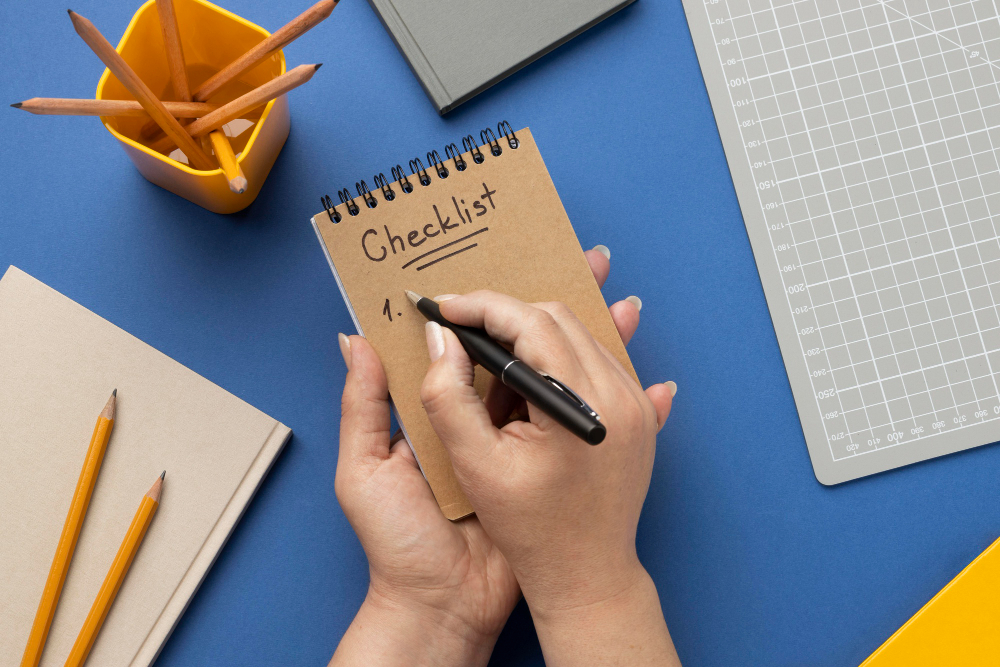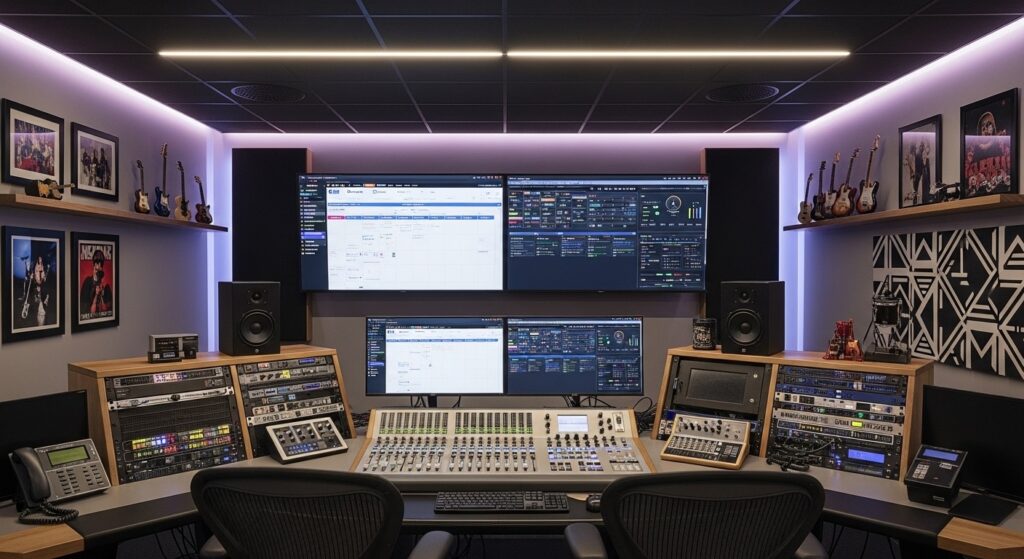
A Venue Manager’s Checklist for Effective Concert Schedule Planning
As the music industry booms following a period of uncertainty, venue managers must prepare for flawless event execution. The success of your events and the satisfaction of your event partners will directly impact your ability to benefit from the growing interest in live music and in-person gatherings.
In all the chaos of event management, successful venue managers take a breath and follow strategic checklists to ensure the show runs smoothly and audiences have an unforgettable experience. The most successful venues have learned that systematic approaches and modern tools can transform overwhelming tasks into streamlined processes.
Flawless event execution is the main goal for venue managers. Optimize your management strategy and create unforgettable experiences with the help of this concert preparation checklist.
1. For effective concert planning, determine your venue’s capacity and technical capabilities
Pre-production concert planning is the most important part of putting on any type of event. Before booking talent, be sure your venue can accommodate artists’ production requirements. If a sophisticated light show is part of the act, the venue must have the technical capabilities to support that level of entertainment. Essential technical considerations include:
Stage infrastructure:
- Maximum weight capacity for equipment and performers
- Stage dimensions and wing space requirements
- Rigging points and load ratings
- Backdrop and curtain systems
- Monitor placement options and sightlines
Power and technical systems:
- Total amperage available across all circuits
- Generator backup systems and failover protocols
- Distribution points throughout the venue
- Clean power access for sensitive equipment
- Emergency power routing
Audio/visual capabilities:
- Front of house positioning and control
- Line array specifications and coverage patterns
- Digital mixing capabilities
- Video walls or projection systems
- Streaming infrastructure and bandwidth
Production spaces:
- Number and size of dressing rooms
- Green room amenities and capacity
- Production office requirements
- Crew rest areas
- Private restroom facilities
Carefully evaluate each aspect of the venue to create immersive and unforgettable experiences for your audience. Address any shortfalls and improve capabilities to attract more popular acts.
2. Research upcoming tour schedules
Stay current with tour schedules while building valuable industry relationships. Understanding the rhythm and patterns of tour routing can make the difference between landing or losing major acts. Without proper tracking systems in place, venues risk missing crucial booking windows or failing to spot routing opportunities. Consider implementing these strategic approaches:
Routing intelligence:
- Track tours that traditionally pass through your region
- Identify gaps in routing that your venue could fill
- Monitor festival schedules for potential radius clause conflicts
- Build relationships with venues in neighboring markets
Agent relationships:
- Maintain regular communication with key booking agents
- Track agent preferences and booking patterns
- Document past successful collaborations
- Create agent-specific venue packages
Tracking opportunities and accessing venue availability can be a major challenge for venue managers who still need to modernize their operations. Paper trails and manual inputs add hours of extra time to management, and you risk losing track of bookings.
Modern venue management platforms have revolutionized how successful venues track and manage bookings. Essential features to look for include:
- Integration with your calendar
- Generation of automatic reports
- Real-time notifications when holds are placed, updated, or confirmed
- Up-to-the-minute information for all stakeholders
- Historical data on artist performance in your market
- Automated conflict checking across multiple calendars
- Mobile accessibility for on-the-go decisions
- Integration with major booking agencies’ systems
With features like these, venue managers can easily track availability, avoid double bookings, and supply real-time updates to event partners. With a streamlined process, you can improve your operations and expect repeat business.
3. Transform data into strategic booking decisions
Success in venue management hinges on understanding your audience and their behaviors. By analyzing historical data, you can make informed decisions about future bookings and maximize revenue potential. Here’s how to break down your analysis:
Track show performance
Start with the basics—which shows succeed and why? Look at:
- Revenue patterns across different genres
- Which days of the week consistently perform best
- Seasonal trends that affect attendance
- How ticket prices impact sales across different show types
- Which marketing channels drive the most ticket sales
Know your audience. Understanding who attends your shows helps target future bookings and marketing:
- Map where your ticket buyers live to understand your true market reach
- Break down attendance by age groups to spot trends
- Identify crossover between genres—fans who attend multiple types of shows
- Track which demographics respond to premium offerings
- Monitor repeat attendance rates to gauge audience loyalty
Measure total revenue impact. Look beyond ticket sales to understand the full financial picture:
- Average food and beverage spending by show type
- Merchandise revenue patterns
- Impact of VIP packages on total revenue
- Parking and other ancillary income sources
- Secondary market activity for high-demand shows
Use data to drive decisions. Modern ticketing systems can turn data into actionable insights:
- Track sales patterns in real-time to adjust marketing
- Spot pricing opportunities based on demand
- Identify which shows merit additional marketing spend
- Forecast attendance based on historical patterns
- Generate reports that help inform future booking decisions
By systematically analyzing this data, you can build a robust understanding of what works for your venue and audience. This knowledge becomes invaluable when negotiating with agents and planning future seasons.
4. Negotiate contracts and fees
As part of your music concert planning, work with agents and promoters to negotiate artist fees, contracts, and rider requirements. Before entering negotiations, ensure you have:
- Historical performance data for similar acts
- Current market conditions analysis
- Detailed venue costs breakdown
- Clear understanding of production requirements
- Flexibility on deal structures
An artist agreement or contract will include:
- Client information
- Concert information and terms
- Timelines
- Costs and payment terms
- Itemization
- Details on artists’ rights
- Cancellation terms
- An agreed-upon statement including names, signatures, and dates
- Force majeure clauses
- Insurance requirements
- Merchandise split agreements
- Recording and streaming rights
- Meet and greet provisions
Related: Social Media Marketing for Concert Promotion: Tips and Tools
A well-drafted artist agreement is crucial to ensuring that both parties are on the same page regarding the terms of the performance. It can help eliminate conflicts and avoid misunderstandings that may arise during or after the concert. This agreement protects the interests of all parties while ensuring a successful event.
5. Develop a production timeline
Without a detailed production timeline, even the most promising shows can fall into chaos. Every successful event requires careful orchestration of multiple departments, vendors, and stakeholders working in harmony. Creating a detailed production timeline is crucial for smooth event execution. Key elements include:
Pre-production planning
- Technical rider review and adaptation
- Production team assignments
- Equipment rental coordination
- Staffing requirements assessment
- Security briefing schedule
Day-of-show timeline
- Load-in schedule with department priorities
- Soundcheck coordination
- Door time management
- Show call times by department
- Strike and load-out planning
Even the most detailed timeline needs flexibility. Build in buffer time for unexpected challenges and maintain clear communication channels across all departments. When your timeline becomes a living document that adapts to real-time needs while maintaining core milestones, you’ve created a framework for consistent success.
6. Create a marketing plan
Marketing a live event requires a sophisticated blend of traditional and modern approaches. The difference between a sold-out show and empty seats often comes down to how well you execute your marketing strategy across multiple channels. Start with:
Marketing team alignment
- Coordinating with artist management on approved assets
- Establishing clear promotional timelines
- Defining target demographics for each show
- Setting specific ticket sale milestones
- Creating contingency plans for slow-selling shows
Digital marketing tactics
- Targeted social media advertising
- Email marketing segmentation
- Influencer partnerships
- Retargeting campaigns
- Content marketing strategy
Traditional marketing channels
- Radio partnerships
- Local media coverage
- Street team deployment
- Cross-promotional opportunities
- Community engagement
The key to marketing success lies in measuring and adjusting your strategies in real time. By tracking engagement metrics and ticket sales velocity, you can pivot your marketing spend and messaging to maximize impact as show day approaches.
7. Secure sponsorships
A well-crafted sponsorship strategy can transform your venue from a cost center into a revenue powerhouse—all while enhancing the overall guest experience through brand partnerships that make sense for your audience. Brands are always searching for ways to connect with their target audiences, and it’s very likely that you share an audience. Strategic sponsorship development can transform your event economics. Consider these key areas:
Creating sponsorship packages
- VIP area naming rights
- Digital display advertising
- Social media integration
- On-site activation opportunities
- Category exclusivity options
Maximizing sponsorship value
- Revenue sharing models
- Brand integration opportunities
- Cross-promotional campaigns
- Enhanced guest experiences
- Data sharing agreements
Create activation strategies that enhance rather than interrupt the concert experience. Consider:
- Interactive brand experiences
- Premium guest amenities
- Exclusive access opportunities
- Custom merchandise collaborations
- Digital engagement programs
Part of your concert preparation checklist strategy can include handing out swag, running sweepstakes, and offering exclusive product experiences. These perks can greatly contribute to the overall audience experience. Creating meaningful brand integrations requires careful planning and execution. When your sponsorship program succeeds, both your venue and sponsor brands become more valuable to your shared audience.
8. Plan logistics
Event logistics form the backbone of successful show execution. Break down your planning into these critical areas:
Staffing management
- Department head responsibilities
- Staff-to-attendee ratios
- Position-specific training requirements
- Shift scheduling and breaks
- Communication protocols
Security operations
- Perimeter control plans
- Crowd management strategies
- Emergency response teams
- Bag check procedures
- VIP area security
Transportation and parking
- Traffic flow planning
- Ride-share pickup/dropoff zones
- Staff parking allocation
- VIP parking areas
- Emergency vehicle access
Staffing solutions
- Build your core team:
- Full-time position justification
- Cross-training opportunities
- Career development paths
- Benefits and retention strategies
- Have flexible staffing:
- Trusted vendor relationships
- On-call staff pools
- Peak season coverage
- Specialized position fulfillment
Operational support:
- Medical services coordination
- Vendor management
- Equipment maintenance
- Waste management
- Utilities coordination
Logistics planning is an interconnected web—each element affects the others. Your ability to seamlessly coordinate these moving parts while maintaining flexibility for last-minute changes will ultimately determine your operational success. Consider implementing a centralized system to track and manage these elements in real-time, ensuring nothing falls through the cracks.
9. Prepare for emergencies
A smart policy is having a contingency plan for disruptions, such as severe weather, power outages, or medical emergencies. Evaluate your current rules and regulations to ensure you have a comprehensive emergency response plan that addresses both common incidents and worst-case scenarios. Your plan should include:
Emergency response framework:
- Command structure
- Communication protocols
- Evacuation procedures
- Medical emergency response
- Weather monitoring systems
Remember to double-check:
- Paperwork your venue requires from clients and suppliers
- Insurance coverage
- Security
- Fire alarms
- Evacuation instructions
- Local guidelines for health, safety, and accessibility
Related: Music Festival Planning Guide: 6 Ways to Streamline Management
Crisis management tools:
- Emergency contact database
- Incident reporting systems
- Staff notification procedures
- Guest communication plans
- Media response protocols
Regularly reviewing and updating health and safety policies can demonstrate your commitment to providing a safe and secure environment for everyone in attendance.
10. Evaluate the success of each show
After each concert, the best event planning software will let you analyze ticket sales, attendance, and audience feedback to evaluate the show’s success. It also gives insight into areas that may need improvement. Your post-event report should include:
Financial performance:
- Ticket sales analysis
- Per-head revenue metrics
- Expense tracking accuracy
- Sponsorship delivery
- Margin analysis by revenue stream
Operational assessment:
- Staff performance and coverage
- Load-in/load-out efficiency
- Security incident reports
- Vendor performance
- Timeline adherence
Future opportunities:
- Capacity optimization
- Revenue stream expansion
- Operating cost reduction
- Service level improvements
- Marketing effectiveness
Highlights and challenges
Take time to emphasize the highlights to determine what should be replicated in future live music events. Make note of the high points in your event planning process.
By acknowledging the challenges you faced in the midst of planning, during the concert, and after the event, you can reflect on what went right and where you need to improve moving forward.
Income and expenses
Where income and expenses are concerned, inform your future planning by including expected and unexpected costs in your financial report. It’s not uncommon to be faced with unforeseen expenditures related to any event, but documenting it each time something happens will ensure you are adequately prepared for the future.
Converting analysis into action
A thorough post-event analysis serves as the foundation for continuous improvement. By systematically evaluating each aspect of your events, you create a cycle of learning that leads to better experiences, stronger financial performance, and a more robust operation. The key is turning these insights into actionable steps for future events.
The path to event excellence
Success in venue management requires attention to detail, strategic thinking, and systematic execution. While this concert preparation checklist provides a framework for success, every venue faces unique challenges that require customized solutions. The key is finding tools and systems that help you implement these best practices consistently while adapting to your specific needs.
Ready to transform your venue operations? Let Prism help you put this concert preparation checklist into action. Our innovative platform streamlines every aspect of venue management, from booking to settlement. Schedule a demo today to see how we can help you create unforgettable events.

Matt Ford is the founder and CEO of Prism.fm, an Austin-based software company revolutionizing live music event management. With a background in entrepreneurship and a degree from the University of Wisconsin-Madison School of Business, Ford combined his self-taught coding skills with firsthand experience as a concert promoter to address the inefficiencies he observed in the industry. In 2018, he launched Prism.fm, an all-in-one platform designed to streamline operations for venues, promoters, and agencies by replacing cumbersome spreadsheets with integrated tools for booking, financial tracking, and contract management. Under his leadership, Prism.fm has grown significantly, achieving $3 million in annual recurring revenue post-COVID and securing over $15 million in funding . Ford’s commitment to building user-centric solutions has positioned Prism.fm as a trusted partner for over 1,500 venues and promoters worldwide.



